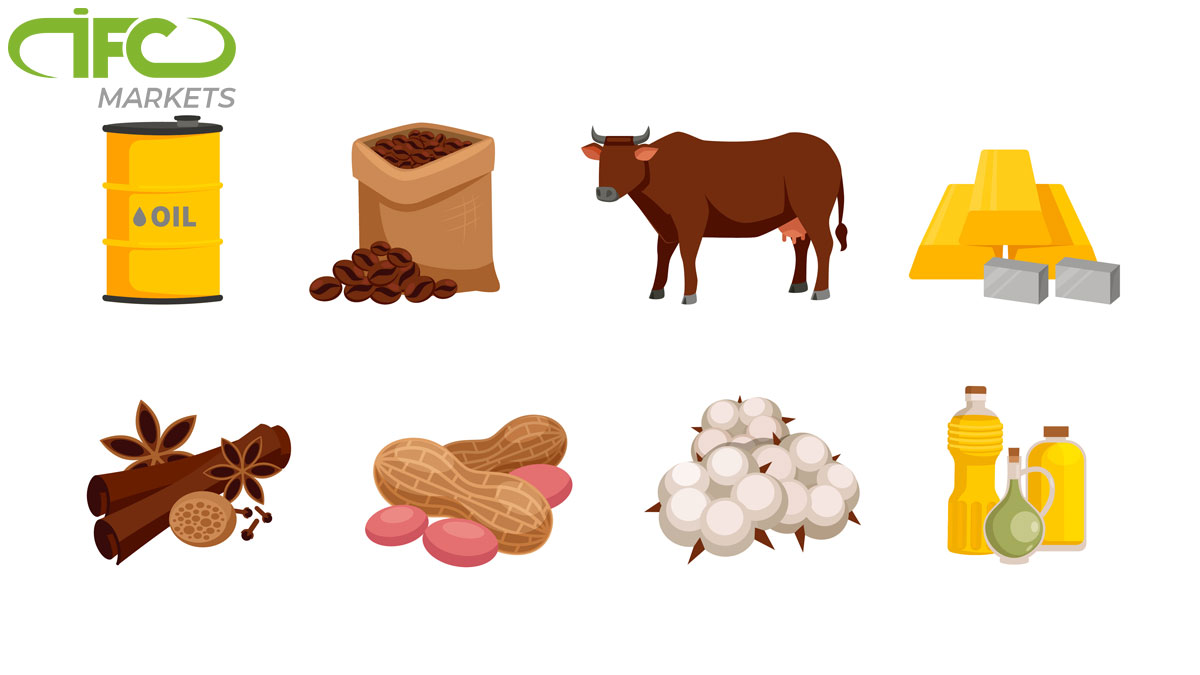- Education
- Introduction to Trading
- What is Commodities Trading
What is Commodities Trading
Trading commodities is a dynamic and multifaceted endeavor that involves the exchange of essential goods at the heart of global commerce. From hard commodities like oil and gold to soft commodities like wheat and coffee, the commodities market encompasses a diverse array of resources that power industries and nourish economies.
In this article we will explore commodities trading, also shed light on the types of commodities, the mechanics of trading, and the array of benefits it presents.
Understanding the mechanisms of commodities trading is essential for navigating this intricate terrain. Whether it's spot trading, involving immediate exchange, or futures trading, where contracts commit to future delivery, each approach carries its own dynamics and implications. Balancing the potential for gains with the inherent risks requires a deep comprehension of market trends, supply-demand dynamics, and risk management strategies.

Commodities trading isn't solely confined to financial gains; it serves as a strategic tool for diversification, risk management, and capitalizing on global trends. This article delves into the myriad benefits of commodities trading, such as acting as a hedge against inflation, offering exposure to non-correlated returns, and providing an avenue for speculating on price movements. Whether as a safeguard during geopolitical uncertainties or as a means to access global markets, commodities trading offers a multifaceted array of advantages.
However, it's important to understand that while the rewards can be big, the commodities market is not without its risks. Extreme price volatility, supply disruptions, and market sentiment fluctuations underscore the importance of thorough research, prudent decision-making, and disciplined risk management.
KEY TAKEAWAYS
- Trading commodities is a dynamic and multifaceted endeavor that involves the exchange of essential goods that lie at the core of global trade.
- Commodities trading isn't solely confined to financial gains; it serves as a strategic tool for diversification, risk management, and capitalizing on global trends.
- Commodities are traded on exchanges around the world. The prices of commodities are affected by a variety of factors, including supply and demand, weather conditions, and economic conditions.
- Commodities, particularly hard commodities like gold and oil, can act as a hedge against inflation.
What is Commodities Trading
Commodities trading involves the exchange of fundamental goods used in commerce, which can be categorized as either hard or soft commodities. Hard commodities encompass natural resources like oil, gold, and natural gas, while soft commodities include agricultural products such as wheat, corn, and soybeans.
This trading practice comes in two primary forms: spot trading and futures trading. In spot trading, commodities are bought and sold for immediate delivery. Conversely, futures trading revolves around the trading of contracts committing to deliver a specified amount of a commodity at a predetermined price on a specific future date.
Numerous motivations underlie commodities trading. Some engage in it to safeguard against inflation, while others see it as a means to speculate on forthcoming price shifts. Commodities also offer a way to diversify investment portfolios, potentially reducing overall risk.
It's crucial to recognize the inherent risks associated with commodity trading. The prices of commodities can exhibit extreme volatility, leading to potential losses if the price of the traded commodity decreases.
When exploring commodities trading, beginners often seek guidance on how to trade commodities effectively, aiming to grasp strategies for navigating the complexities of these markets. If you are a beginner we welcome you to explore “How To Trade Commodities” article.
Types of Commodities
Commodities are traded on exchanges around the world. The prices of commodities are affected by a variety of factors, including supply and demand, weather conditions, and economic conditions. Commodities can be a good way to diversify a portfolio and reduce risk. However, commodities are also a risky investment, and it is important to understand the risks before start trading.
There are many different types of commodities, but they can be broadly classified into six categories:
1. Hard Commodities
Hard commodities are natural resources that are extracted from the earth. They often play crucial roles in industrial processes, manufacturing, and construction.
Examples:- Oil: Crude oil is a fundamental energy source used in various applications, including transportation and petrochemical production.
- Gold: Gold is a precious metal valued for its rarity and used in jewelry, investment, and electronics.
- Natural Gas: Natural gas is utilized for heating, electricity generation, and as a cleaner energy alternative.
- Copper: Copper is essential for electrical wiring, plumbing, and electronics manufacturing.
- Silver: Silver is used in electronics, photography, and as a store of value.
2. Soft Commodities
Soft commodities are agricultural products that are grown or harvested. They are essential for food production and consumption.
Examples:- Wheat: Wheat is a staple grain used in making bread, pasta, and various food products.
- Corn: Corn is used as livestock feed, in food production, and for industrial purposes like ethanol production.
- Soybeans: Soybeans are a versatile legume used for animal feed, food products (like soy milk and tofu), and as a source of oil.
- Coffee: Coffee beans are roasted and brewed to produce the globally consumed beverage.
- Cotton: Cotton is a natural fiber used in clothing, textiles, and various consumer goods.
- Sugar: Sugar is derived from sugarcane or sugar beets and is used as a sweetener and ingredient in food and beverages.
3. Livestock Commodities
Livestock includes live animals raised for meat, dairy, and other byproducts.
Examples:- Cattle: Cattle are raised primarily for beef production.
- Hogs (Pigs): Hogs are raised for pork production and its byproducts like bacon and ham.
- Poultry (Chickens): Chickens are raised for meat (chicken) and egg production.
- Sheep: Sheep are raised for meat (lamb and mutton) and wool.
4. Precious Metals
Precious metals are highly valued for their rarity and often used in investment and industrial applications.
Examples:- Platinum: Platinum is used in catalytic converters, jewelry, and electronics.
- Palladium: Palladium is used in catalytic converters, electronics, and dentistry.
- Rhodium: Rhodium is primarily used in catalytic converters and as a catalyst in chemical processes.
5. Industrial Metals
Industrial metals are used in various manufacturing and construction processes.
Examples:- Aluminum: Aluminum is used in transportation, packaging, and construction.
- Nickel: Nickel is used in stainless steel production, batteries, and electronics.
- Zinc: Zinc is used in galvanizing steel, producing alloys, and in various applications like batteries.
6. Energy Commodities
Energy commodities are sources of energy used for power generation and transportation.
Examples:- Crude Oil: Crude oil is refined into fuels like gasoline, diesel, and jet fuel.
- Natural Gas: Natural gas is used for heating, electricity generation, and as a fuel for vehicles.
- Coal: Coal is used in electricity generation and industrial processes.
Here's a table summarizing the types of commodities:
| Hard Commodities | Oil, Gold, Natural Gas, Copper, Silver | Extracted natural resources for industrial use and energy. |
| Soft Commodities | Wheat, Corn, Soybeans, Coffee, Cotton | Agricultural products used for food, textiles, and materials. |
| Livestock | Cattle, Hogs (Pigs), Poultry (Chickens), Sheep | Live animals raised for meat, dairy, and other products. |
| Precious Metals | Platinum, Palladium, Rhodium | Rare metals valued for investment and industrial applications. |
| Aluminum, Nickel, Zinc | Platinum, Palladium, Rhodium | Metals used in manufacturing, construction, and other industries. |
| Energy Commodities | Crude Oil, Natural Gas, Coal | Energy sources for power generation, transportation, and industrial processes. |
Benefits of Commodity Trading
Commodity trading offers several benefits for traders, investors, and businesses. Here are some of the key advantages:
- Diversification: Commodities provide an additional asset class that can diversify an investment portfolio. Their prices often don't correlate closely with traditional financial assets like stocks and bonds, which can help reduce overall portfolio risk.
- Inflation Hedge: Commodities, particularly hard commodities like gold and oil, can act as a hedge against inflation. When the prices of goods and services rise, the value of commodities may also increase, helping to preserve purchasing power.
- Global Exposure: Commodities trading provides exposure to global markets and economies. This can be particularly beneficial for investors looking to diversify their holdings across different regions.
- Liquidity: Many commodities are traded on liquid markets, making it relatively easy to buy and sell positions. This liquidity can allow traders to enter and exit positions with less difficulty.
- Speculation Opportunities: Traders can profit from both upward and downward price movements in commodities markets. This speculative nature allows for potential profit even in declining markets.
- Risk Management: Businesses that rely on certain commodities as inputs can use commodity futures contracts to manage their exposure to price volatility. This helps in stabilizing costs and ensuring consistent supply.
- Geopolitical Stability: Some commodities, like precious metals, can serve as safe-haven assets during times of geopolitical uncertainty, providing a buffer against market volatility.
- Access to Non-Correlated Returns: Commodities often exhibit different price behaviors compared to traditional financial assets. This can lead to the potential for non-correlated returns, which can be advantageous for portfolio optimization.
- Supply and Demand Fundamentals: Commodities are influenced by tangible factors like supply disruptions, weather events, and global demand trends. This makes their price movements more driven by fundamentals than abstract market sentiments.
- Potential for High Returns: Due to the volatility of commodity markets, there's potential for substantial gains if traders correctly anticipate price movements. However, it's important to note that high returns also come with higher risk.
- Accessibility: With online trading platforms and brokerage accounts, accessing commodity markets has become more straightforward for retail investors and traders.
While there are benefits to commodity trading, there are also inherent risks due to
- market volatility,
- supply disruptions,
- and other factors.
A thorough understanding of the specific commodities being traded, market trends, and risk management strategies is essential for successful commodity trading.
Bottom line on What is Commodities Trading
In essence, commodities trading stands as the vibrant realm where fundamental resources, driving the engine of the global economy, are exchanged. This dynamic arena offers a gateway not only to diversify investments and manage risks but also to capitalize on emerging market trends. It's like a strategic puzzle where pieces of goods intertwine with economic forces.
Nevertheless, it's essential to approach this field with a balanced outlook. While the potential benefits are enticing, the associated risks, often associated with constantly changing market conditions, should not be overlooked. With a solid understanding of the mechanics, market dynamics and potential benefits, commodity trading opens up many opportunities.

